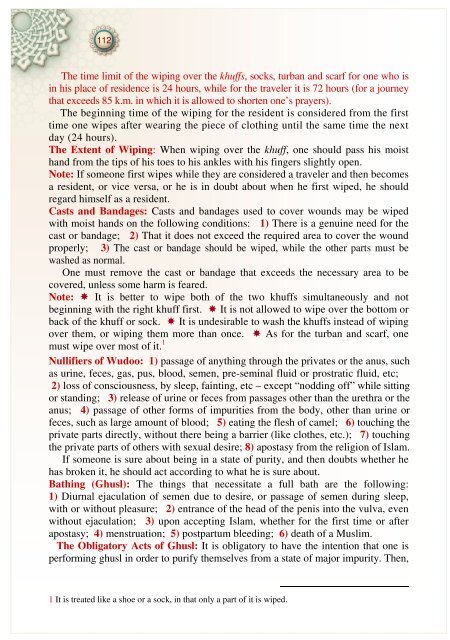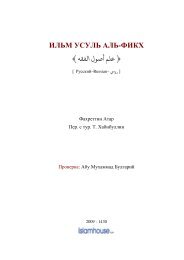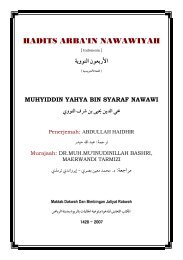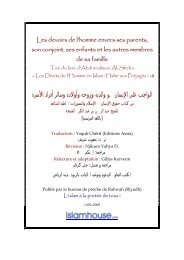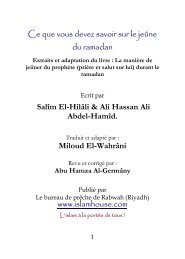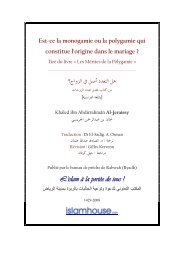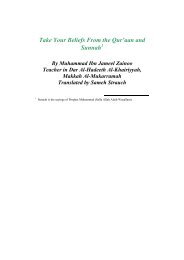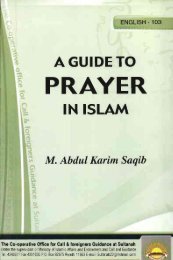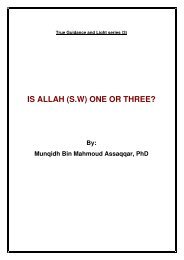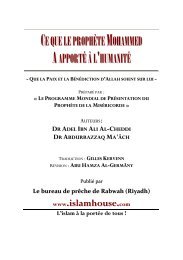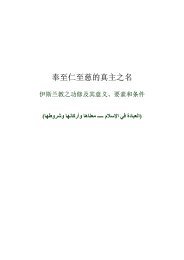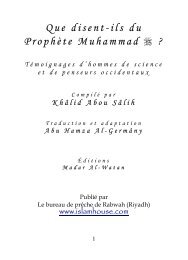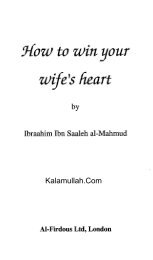are there? - Islam Center
are there? - Islam Center
are there? - Islam Center
Create successful ePaper yourself
Turn your PDF publications into a flip-book with our unique Google optimized e-Paper software.
112<br />
The time limit of the wiping over the khuffs, socks, turban and scarf for one who is<br />
in his place of residence is 24 hours, while for the traveler it is 72 hours (for a journey<br />
that exceeds 85 k.m. in which it is allowed to shorten one’s prayers).<br />
The beginning time of the wiping for the resident is considered from the first<br />
time one wipes after wearing the piece of clothing until the same time the next<br />
day (24 hours).<br />
The Extent of Wiping: When wiping over the khuff, one should pass his moist<br />
hand from the tips of his toes to his ankles with his fingers slightly open.<br />
Note: If someone first wipes while they <strong>are</strong> considered a traveler and then becomes<br />
a resident, or vice versa, or he is in doubt about when he first wiped, he should<br />
regard himself as a resident.<br />
Casts and Bandages: Casts and bandages used to cover wounds may be wiped<br />
with moist hands on the following conditions: 1) There is a genuine need for the<br />
cast or bandage; 2) That it does not exceed the required <strong>are</strong>a to cover the wound<br />
properly; 3) The cast or bandage should be wiped, while the other parts must be<br />
washed as normal.<br />
One must remove the cast or bandage that exceeds the necessary <strong>are</strong>a to be<br />
covered, unless some harm is fe<strong>are</strong>d.<br />
Note: It is better to wipe both of the two khuffs simultaneously and not<br />
beginning with the right khuff first. It is not allowed to wipe over the bottom or<br />
back of the khuff or sock. It is undesirable to wash the khuffs instead of wiping<br />
over them, or wiping them more than once. As for the turban and scarf, one<br />
must wipe over most of it. 1<br />
Nullifiers of Wudoo: 1) passage of anything through the privates or the anus, such<br />
as urine, feces, gas, pus, blood, semen, pre-seminal fluid or prostratic fluid, etc; <br />
2) loss of consciousness, by sleep, fainting, etc – except “nodding off” while sitting<br />
or standing; 3) release of urine or feces from passages other than the urethra or the<br />
anus; 4) passage of other forms of impurities from the body, other than urine or<br />
feces, such as large amount of blood; 5) eating the flesh of camel; 6) touching the<br />
private parts directly, without <strong>there</strong> being a barrier (like clothes, etc.); 7) touching<br />
the private parts of others with sexual desire; 8) apostasy from the religion of <strong>Islam</strong>.<br />
If someone is sure about being in a state of purity, and then doubts whether he<br />
has broken it, he should act according to what he is sure about.<br />
Bathing (Ghusl): The things that necessitate a full bath <strong>are</strong> the following:<br />
1) Diurnal ejaculation of semen due to desire, or passage of semen during sleep,<br />
with or without pleasure; 2) entrance of the head of the penis into the vulva, even<br />
without ejaculation; 3) upon accepting <strong>Islam</strong>, whether for the first time or after<br />
apostasy; 4) menstruation;5) postpartum bleeding; 6) death of a Muslim.<br />
The Obligatory Acts of Ghusl: It is obligatory to have the intention that one is<br />
performing ghusl in order to purify themselves from a state of major impurity. Then,<br />
1 It is treated like a shoe or a sock, in that only a part of it is wiped.


